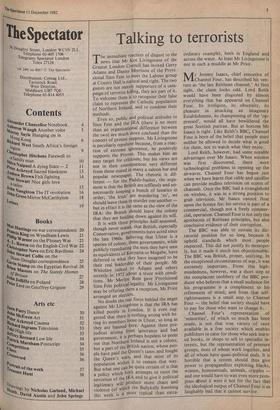Talking to terrorists
The immediate reaction of disgust to the news that Mr Ken Livingstone of the Greater London Council has invited Gerry Adams and Danny Miarrison of the Provi- sional Sinn Fein to meet the Labour group at County Hall is natural and right. The two guests are not merely supporters of a cam- paign of terrorist killing, they are part of it. To welcome them is to recognise their false claim to represent the Catholic population of Northern Ireland, and to condone their
methods. Even so, public and political attitudes to Sinn Fein and the IRA (there is no more than an organisational difference between the two) are much more confused than the concert of protest suggests. Mr Livingstone is peculiarly repulsive because, from a reac- tion of extreme ignorance, he positively supports the Provos: This makes him an easy target for criticism; but his views are not in their consequences very different from those stated in many a saloon bar and popular newspaper. The rhetoric is dif- ferent — for the Paddy-basher, the argu- ment is that the British are selflessly and un- necessarily keeping a bunch of lunatics in order; 'the Irish' are murdering 'us', we should leave them to murder one another — but in effect it is the same as the view of the IRA: the British should leave the colony that they areholding down against its will.
It is with these principles half-assumed, though never stated, that British, especially Conservative, governments have acted since the late 1960s. Believing that Ulster is a species of colony, these governments, while publicly repudiating the men they have seen as equivalents of Kenyatta or Mugabe, have deferred to what they have imagined to be their real leadership of their people. Mr Whitelaw talked to Adams and others secretly in 1972 about a truce with condi- tions. Mr Merlyn Rees gave Provisional Sinn Fein political legality. Mr Livingstone may be offering them a reception, Mr Prior arranged an election. No doubt the real force behind the anger against Mr Livingstone is that the IRA has killed people in London. It is even sug- gested that there is nothing wrong with let- ting its members loose in Ulster, so long as they are banned here.. Against these pre- judices arising from ignorance and bad government, it is perhaps hopeless to point out that Northern Ireland is not a colony, but a part of the British nation, whose peo- ple have paid the Queen's taxes and fought the Queen's wars,, and that most of its population wishes it to remain that way. But what one can be quite certain of is that a policy which both attempts to resist the terrorism of the IRA and to give it political legitimacy will produce more chaos and violence (of which the Ballykelly bombing this week is a more typical than extra-
ordinary example), both in England and across the water. At least Mr Livingstone is not in such a muddle as Mr Prior.
Mr Jeremy Isaacs, chief executive of Channel Four, has described his ven- ture as 'the last Reithean channel.' At first sight, the claim looks odd. Lord Reith would have been disgusted by almost everything that has appeared on Channel Four. Its irreligion, its obscenity, its pleasure in attacking an imaginary Establishment, its championing of the 'op- pressed', would all have bewildered the great Scottish puritan. But at bottom Mr Isaacs is right. Like Reith's BBC, Channel Four is born of the belief that people must neither be allowed to decide what is good for them, nor to watch what they enjoy.
Lord Reith, however, had some notable advantages over Mr Isaacs. When wireless was first discovered, there were technological problems in opening up the airwaves. Channel Four has begun just when we have learnt that cable and satellite can provide endless television on scores of channels. Once the BBC had a stranglehold on wireless, it was in a strong position to grab television. Mr Isaacs cannot float upon the licence fee: his service is part of a commercial, though not a freely commer- cial, operation. Channel Four is not only the apotheosis of Reithean principles, but also conclusive evidence of their corruption.
The BBC was able to sustain its dic- tatorial position for so long because it upheld standards which most people respected. This did not justify its monopo- ly, but it made it much less objectionable. The BBC was British, proper, unifying. In the exceptional circumstances of war, it was extremely important. From this high- mindedness, however, was a short step to the complacent snobbery of the BBC pro- ducer who believes that a small audience for his programme is a compliment to his refinement of mind; and from that self- righteousness is a small step to Channel Four — the belief that society should have to pay for those who want to change it.
Channel Four's representation of 'minorities', of which so much has been made, is not that true variety of taste available in a free society which enables publishers to cater for those who seek learn- ed books, or shops to sell to specialist in- terests, but the representation of pressure groups, most of whom work together, and all of whom have quasi-political ends. It is horrible that a system should thus give power to propagandists exploiting blacks, women, homosexuals, animals, cripples — and one would have to wax even more pom- pous about it were it not for the fact that the ideological output of Channel Four is so laughably bad that it cannot survive.










































 Previous page
Previous page